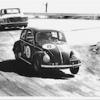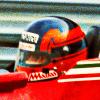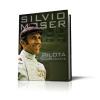
Who was the first 'Rain Master'?
#1

Posted 04 March 2013 - 18:07
A thought piqued my curiosity last night while reading about the 1968 German GP at the Nurburgring; Who was considered to be the first "Rain Master" in Formula One? I've heard the name applied to Schumacher, Senna, Tom Pryce, Stewart, etc but I truthfully don't have any knowledge of drivers before the mid-late 60's. Could anyone provide a thought as to the first driver regarded as the best in the rain?
Advertisement
#2

Posted 04 March 2013 - 18:15
#3

Posted 04 March 2013 - 19:32
#4

Posted 04 March 2013 - 19:38
Caracciola never raced in Formula 1
#5

Posted 04 March 2013 - 19:38
#6

Posted 04 March 2013 - 19:39
He was known as the "Rainmaster", though. I read [many years ago] that Alfred Neubauer said Caracciola had "Fish Eyes", and that he drove in the rain without goggles.Caracciola never raced in Formula 1
#7

Posted 04 March 2013 - 19:51
In which field S Moss has to be towards the top of the list
#8

Posted 04 March 2013 - 21:28
"Who, in the Formula 1 era, could be considered the inheritor (or inheritors) of Rudolf Caracciola's title of Der Regenmeister (The rainmaster)?
Hmmm, Stirling Moss, Jackie Stewart, Pedro Rodriguez, Jacky Ickx and Ayrton Senna all scored famous wins in the rain. But I don't think of any as being good only in the rain. Come to think of it the same applies to Caracciola - he simply won a couple of wet German GPs and was given the name by the patriotic German media.
Edited by D-Type, 04 March 2013 - 21:29.
#9

Posted 04 March 2013 - 21:41
Inherently I forgot that 'Formula One' is a name which is applied beginning at a certain point in Grand Prix history. The way I should have worded the question would be 'Who was the first rain master in Grand Prix racing?'
Edited by grandiracing, 04 March 2013 - 21:41.
#10

Posted 04 March 2013 - 22:18
#11

Posted 04 March 2013 - 22:40
Is there any evidence of Caracciola driving in the rain without goggles?He was known as the "Rainmaster", though. I read [many years ago] that Alfred Neubauer said Caracciola had "Fish Eyes", and that he drove in the rain without goggles.
And what is the first definite instance of his being called Regenmeister?
#12

Posted 04 March 2013 - 22:57
But if one considers Eff 1, then any of the afforementioned would suffice I reckon.
Edited by jj2728, 04 March 2013 - 23:03.
#13

Posted 04 March 2013 - 23:00
Caracciola never raced in Formula 1
As this thread shows, there have been a few worthy Regenmeisters over the years, but surely only one man was ever called "Nebelmeister" (fog master). It was Bernd Rosemeyer of course, though F1, racing generally in fact, has been so sanitised, that isn't a talent there's much call for these days.
Re. David McKinney's point, S Moss should rightly head almost any list of essential driving skills, as long as you disregard traversing the Mersey Tunnel.
#14

Posted 04 March 2013 - 23:05
Anybody care to name any other known rain-haters?
Prost?
#15

Posted 04 March 2013 - 23:06
S Moss should rightly head almost any list of essential driving skills, as long as you disregard traversing the Mersey Tunnel.
and the A41 near Newport...
#16

Posted 04 March 2013 - 23:39
Originally posted by D-Type
.....Hmmm, Stirling Moss, Jackie Stewart, Pedro Rodriguez, Jacky Ickx and Ayrton Senna all scored famous wins in the rain. But I don't think of any as being good only in the rain. Come to think of it the same applies to Caracciola - he simply won a couple of wet German GPs and was given the name by the patriotic German media.
I don't think the title is lost if one is only good in the rain...
Another famous wet weather victory went to Graham Hill in August 1962, but in that race we had John Surtees and Dan Gurney on his tail all the way and Jim Clark catching up until he felt he was simply going too far.
But the lack of the Surtees name in any posts so far is surprising.
Anyone truly interested in this subject would simply have to read Jenks' report on the wet Solitude Grand Prix of 1964 and see his description of Surtees tip-toeing away from Clark when the road was at its most treacherous in a car less suitable for those conditions.
There was an excellent thread on this subject back a few years ago... have a look at it right here.
Edited by Ray Bell, 05 March 2013 - 04:55.
#17

Posted 04 March 2013 - 23:54
#18

Posted 05 March 2013 - 00:20
#19

Posted 05 March 2013 - 01:49
Originally posted by seldo
Jochen Rindt...
Were there other examples than the drive at Warwick Farm?
It's interesting when you look at it. He got pole and raced off into the lead, then his two main rivals crashed at Polo, which held up the rest of the field as he got away. By the time Derek Bell got by Hill into third place he was 34 seconds behind. At the end he was 45 seconds behind. Over thirty-plus laps he lost just eleven seconds, yet his best lap was over a second slower.
Graham Hill had the fastest lap in that race in a car similar to Rindt's, just one tenth faster, but those laps were undoubtedly during the period in the race when it dried out a bit.
So... in conclusion... during the wettest part of the race, Derek was at least holding Rindt, possibly catching a little. With less wing, similar tyres, less power.
Another one for a lengthy discussion around the bar!
Advertisement
#20

Posted 05 March 2013 - 02:20
I don't think the title is lost if one is only good in the rain...
Another famous wet weather victory went to Dan Gurney in August 1962, but in that race we had John Surtees and Dan Gurney on his tail all the way and Jim Clark catching up until he felt he was simply going too far.
But the lack of the Surtees name in any posts so far is surprising.
Anyone truly interested in this subject would simply have to read Jenks' report on the wet Solitude Grand Prix of 1964 and see his description of Surtees tip-toeing away from Clark when the road was at its most treacherous in a car less suitable for those conditions.
There was an excellent thread on this subject back a few years ago... have a look at it right here.
As good as Dan was, I don't think he would claim to have come 1st and 3rd in the German Grand Prix.
#21

Posted 05 March 2013 - 04:56
I must have less on my mind when I make posts like that!
At least Barry Boor would have understood.
#22

Posted 05 March 2013 - 06:04
This is not the piece that I remember reading years ago....still trying to find it.Is there any evidence of Caracciola driving in the rain without goggles?
And what is the first definite instance of his being called Regenmeister?
"Carracciola was the Regenmeister ( rain master ), besides his car controll in the rain he had also found out that taking his goggles off in the rain and just let his eyes flood with water made him see better that he could with his goggles on..."
#23

Posted 05 March 2013 - 06:22
He drove a wet race at the Farm with his goggles around his collar.
#24

Posted 05 March 2013 - 06:47
Here's one according to Murray Walker and Andrew Benson:Were there other examples than the drive at Warwick Farm?
It's interesting when you look at it. He got pole and raced off into the lead, then his two main rivals crashed at Polo, which held up the rest of the field as he got away. By the time Derek Bell got by Hill into third place he was 34 seconds behind. At the end he was 45 seconds behind. Over thirty-plus laps he lost just eleven seconds, yet his best lap was over a second slower.
Graham Hill had the fastest lap in that race in a car similar to Rindt's, just one tenth faster, but those laps were undoubtedly during the period in the race when it dried out a bit.
So... in conclusion... during the wettest part of the race, Derek was at least holding Rindt, possibly catching a little. With less wing, similar tyres, less power.
Another one for a lengthy discussion around the bar!
"Nevertheless, what marked him out was his ability to create moments that took the breath away. One such was at the wet Silverstone International Trophy in 1969.
Rindt was making up ground after being delayed by an earlier engine problem, which then cleared.
Heading on one lap into Stowe Corner - then a super-fast bend that tested the very best - Rindt was closing on Piers Courage and Jacky Ickx, who themselves were coming up to lap Pedro Rodriguez and Graham Hill. When they turned into the corner, Rindt was at the back of the five cars; when they came out, he was at the front. "
#25

Posted 05 March 2013 - 07:06
That one would also have been in a winged Lotus 49. It would certainly have been a sight to see!
#26

Posted 05 March 2013 - 07:54
Naturally I'd say that (
#27

Posted 05 March 2013 - 08:02
#28

Posted 05 March 2013 - 08:27
But for the life of me I cannot think of a wet race where he was said to excel.
#29

Posted 05 March 2013 - 08:33
All the Americans.Anybody care to name any other known rain-haters?
#30

Posted 05 March 2013 - 08:46
#31

Posted 05 March 2013 - 09:22
Anybody care to name any other known rain-haters?
Be careful!All the Americans.
In all fairness, first, there was _________; and don't forget _________; and surely _________ deserves mention.
#32

Posted 05 March 2013 - 09:26
Be careful!

In all fairness, first, there was Dan Gurney; and don't forget Mark Donohue; and surely Eddie Cheever deserves mention.
#33

Posted 05 March 2013 - 09:43
#34

Posted 05 March 2013 - 09:44
Eines der Hockenheim F2 Rennen 1972 zeigte das besonders deutlich, wo einige Journalisten von Firestone als Regenmeister sprachen.
In Wahrheit solange der Regen am Rennbeginn heftig war rückten die Good Year Bereiften nach vorn, eben bis der Regen nachliess und sich das Bild komplett änderte. Das gleiche wiederholte sich im zweiten Lauf.
Sicherlich zurzeit von Caracciola war der Fahrer auschlaggebend, das dauerte bis ungefähr 1965 als die Reifen trocken oder nass ausschlaggebend wurden.
I think from around 1970 a lot of drivers could be rain master or the same otherwise. It ware important to have the right tires.
One of the Hockenheim F2 race in 1972 showed this very clearly, where some journalists spoke from Firestone as rain master.
In truth, as long as the rain at the start of the race was intense Goodyear tires moved forward, just until the rain subsided and the picture changed completely. The same thing happened in the second round.
Certainly, at the time of Caracciola the driver was sole criterion, which lasted until about 1965 when the tires dry or wet were increasingly crucial.
.
#35

Posted 05 March 2013 - 10:50
Welcome to the conversation, Beat, you've been missed!
#36

Posted 05 March 2013 - 11:23
That's what the bike boys thought because the Americans, understandably, don't race in the rain on banked ovals. But, they forgot that the American bikers had learned their trade on dirt tracks and did know how to handle lack of adhesion, and the result was they were roundly trounced one wet Easter weekend.All the Americans.
Driving a car in the rain takes a certain delicacy of touch and of throttle control (Ayrton Senna comes to mind), which are both part of the skill set of any driver. It comes down to the difference between good control and excellent control being more apparent in the wet. Agreed that since around, say, the late sixties the vastly improved rain tyres have masked the differences. I suppose in the 'modern tyres' context we should be looking at virtuoso performances on 'dry' tyres in the wet. We have also seen some monumental cock-ups in tyre choice by teams and drivers - I blame the teams first as they have access to weather forecast data and can look upwind more readily than the drivers, but sometimes drivers have shown that they don't necessarily know best.
#37

Posted 05 March 2013 - 11:59
For Surtees car control, watch the aerial footage of him at Spa in 1966 - the Ferrari stays in a straight line even though Big John's arms are all over the place in the cockpit. Former motor-cyclists have an innate sense of track surface conditions.
#38

Posted 05 March 2013 - 12:13
The 1979 F2 races at Silverstone (International Trophy) and Pau, for starters."and surely Eddie Cheever deserves mention"
Can someone be so kind to remind whenever Cheever was a "rain master" - or any good on the rain. I would like to remember, before someone says I am favourably biaised towards good ol' Eddie.
#39

Posted 05 March 2013 - 14:20
How could you possibly forget ____________????????????In all fairness, first, there was _________; and don't forget _________; and surely _________ deserves mention.
Advertisement
#40

Posted 05 March 2013 - 14:23
How could you possibly forget ____________????????????
Please!!! We'll have none of that kind of language on here!!!
#41

Posted 05 March 2013 - 14:24
Fair point about the tyre advantage, Lucio.At the time he credited his father for making him test on a wet Pista d'Oro with his kart when growing up. If you believed him, he was a new Jacky Ickx. The tires (Pirelli) - as Beat tried to point out above - didn't obviously have any influence on the outcome...
#42

Posted 05 March 2013 - 15:17
I'm probably going to offend everyone with my examples here however:
Senna at Donington; a series of stupidly brave overtaking manoevres on the first lap, on the principle that it may or may not work but worth trying, then a clear track and better forecasting of what tyres were needed, when, than anyone else;
Stewart at the Nurburgring; Dunlop had the better rain tyres, once ahead he had a clear track and on such a long lap less problems with lapping;
Surtees at Spa; this was mentioned earlier but surely Rindt passed him and Surtees only got back ahead when the track started to dry out. Conundrum there; are we saying the Cooper was a better car than the Ferrari? Or does it prove my point that Rindt was just more in the groove that day?
As the out and out rain master someone from left field who hasn't been mentioned, Duncan Hamilton.
#43

Posted 05 March 2013 - 15:31
GILLES VILLENEUVE!
Naturally I'd say that (), but was anyone else double-digit-seconds faster than #2 in any session, ever?
It's probably been done before at the Nurburgring, but it was never done by Gilles.
#44

Posted 05 March 2013 - 15:45
Watkins Glen '79, 11 seconds faster than the entire field in Friday practice. It didn't rub off on Jaques though, he cost Peugeot their first diesel win.It's probably been done before at the Nurburgring, but it was never done by Gilles.
Jacky Ickx for me though was the Rain Master
Edited by milestone 11, 05 March 2013 - 15:49.
#45

Posted 05 March 2013 - 15:59
Watkins Glen '79, 11 seconds faster than the entire field in Friday practice.
Urban myth I'm afraid, although the actual gap of about 9.5 secs was still pretty impressive. Not quite double digits though.
#46

Posted 05 March 2013 - 17:09
Stewart at the Nurburgring; Dunlop had the better rain tyres, once ahead he had a clear track and on such a long lap less problems with lapping;
Good points, but Stewart went from 6th to 1st in 2/3rds of a lap and had a broken wrist to boot, and the 'clear track' resembled a river in parts.
#47

Posted 05 March 2013 - 17:27
Good points, but Stewart went from 6th to 1st in 2/3rds of a lap and had a broken wrist to boot, and the 'clear track' resembled a river in parts.
I bow to superior knowledge, I thought he was ahead sooner than that, however by clear track I meant lack of of spray due to other cars. In a way I'm paying devil's advocate here, I thought it was a fantastic drive.
#48

Posted 05 March 2013 - 18:31
Just to clarify, I believe the gap was 11 seconds when Gilles set the time but Scheckter subsequently went faster than he had previously. Either way, 9.6 seconds in a 3 mile lap is a lifetime in F1 terms.Urban myth I'm afraid, although the actual gap of about 9.5 secs was still pretty impressive. Not quite double digits though.
Jonathan
#49

Posted 05 March 2013 - 20:30
#50

Posted 05 March 2013 - 20:39
How could you possibly forget ____________????????????
Please!!! We'll have none of that kind of language on here!!!
Well, 14 miles is quite longer than 3-something — and 'probably' didn't apply at the Glen in '79.It's probably been done before at the Nurburgring, but it was never done by Gilles.
Thatta Boy!Watkins Glen '79, 11 seconds faster than the entire field in Friday practice.
Urban myth I'm afraid, although the actual gap of about 9.5 secs was still pretty impressive. Not quite double digits though.
Never heard of a stopwatch called an 'urban myth' before. Gotta brush up on my primary language.
That's what I'm talkin' 'bout!Just to clarify, I believe the gap was 11 seconds when Gilles set the time but Scheckter subsequently went faster than he had previously. Either way, 9.6 seconds in a 3 mile lap is a lifetime in F1 terms.


























